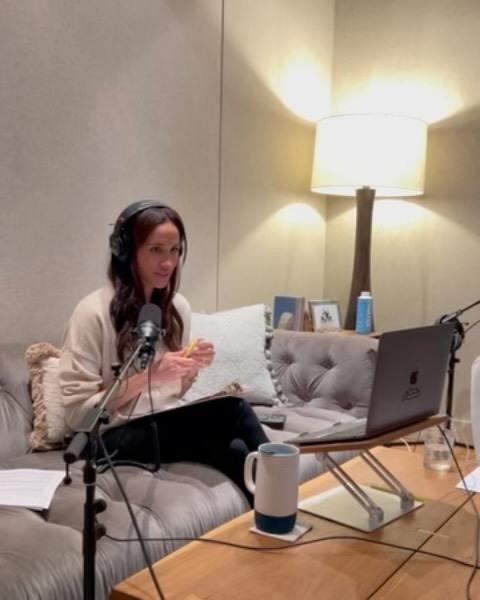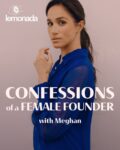While I want the Duchess of Sussex to have unquestioning success at everything she undertakes, I understand why the conversations about her Confessions of a Female Founder podcast have quieted down. I’m not even following how COAFF is charting week by week, because I don’t even think it matters? Like, Meghan’s association with Lemonada is not going anywhere, she will probably continue to do this COAFF podcast and maybe other pods. I feel like Meghan is just trusting that COAFF will find an audience, and maybe it will be a niche audience, but that’s how it goes. But for my money, I’m much more engaged with what Meghan is doing with COAFF than what she did with Archetypes. The conversations with female founders are personal and professional, and I learn so much about everyone involved. This week’s COAFF pod is an interview with Heather Hasson, who founded FIGS, the medical-scrubs company. This is a rare interview where Meghan didn’t know an interview subject socially or have any history with the person. It was really great! Here’s what People Mag thought was important:
In an unexpected way, studying acting in college prepared Meghan Markle for her future as a founder. The Duchess of Sussex, 43, spoke about what she learned during her days at Northwestern University in a conversation with FIGS medical scrubs creator Heather Hasson on the latest episode of her podcast Confessions of a Female Founder from Lemonada Media, released on May 13.
Meghan said, “I was a theater major, and part of the program was that you couldn’t just do the acting. You had to do soup-to-nuts, every part of what a production would entail, which I actually think is incredible training for when you’re running a team because you appreciate what the sound person does and what the lighting person does.”
“Wardrobe department and sewing were part of it too, so I am comfortable with a sewing machine,” she added, bringing the discussion back to Hasson’s introduction to her scrubs business.
I keep forgetting that Meghan majored in International Relations AND Theater. She would have been such a natural over there long-term, but hey, they were mad because she was such a natural. Meghan and Heather also talk about cooking and Heather says that she’s a terrible cook and she hopes to pick up some tips from With Love, Meghan. Meghan talked about how she doesn’t cook everything fresh and from scratch every single day, sometimes it’s just putting takeout in a nice dish and maybe throwing together a salad. Give yourselves a break, ladies!
Photos courtesy of Lemonada Media, Meghan’s IG and screengrabs from the Jamie Kern Lima Show.

















Oh no!!! She doesn’t make everything fresh every day???!!! The HORROR!!!!
Yes you don’t have to cook from scratch every day. I am great at putting takeouts in a nice plate too. Meg is a very well rounded individual. She loves learning and putting what she has learned to many parts of her life. Cue the haters for her not cooking from scratch every day but they better be careful what they say because the lily white princess has cooks and other help.
I love that she specifically noted that multiple times in With Love, Meghan- that its is not all from scratch. Store bought is fine. You don’t have time to do everything.
It is an important message to women in our world.
Yes, my major take-away from WLM is that I can make things nice with what I have. Why not drink my coffee from my nice china cups instead of cracked and faded souvenir mugs? Why not dish out my leftovers onto a pretty plate instead of eating them out the plastic yogurt container? It’s been years since I was at university, but I’m still living like a student.
For me, one of the primary appeals of takeout is the lack of dishes. I don’t just want to not cook, I want to not clean up either. So imo, plating takeout to make it look nice defeats the purpose, but you do Meghan.
That’s an interesting take she brought up about her education. And it shows her natural curiosity and respect for others; it sounds like she was glad to learn all the different things that go into a production and that every person involved plays an important role, instead of self-centeredly being all “why must I bother, i should be focused on The Craft!”
I did theater through high school and college, and I ended up loving the production side more than the acting, which I was decent at and also very much enjoyed.
Doing props, helping out with costumes and makeup, sets, directing, script writing, lighting, stage management — it was all fun, all educational, all grist for the mill that eventually led me to focus on poetry as the creative work of my life.
And theater at the college level is absolutely great training for how to work within and manage a team, if your program or your preferences take you that way.
It’s all volunteer, and even though some of it is for class credit much of it isn’t, or at least wasn’t at the universities I attended. So it can really be like herding cats.
I loved it, not least because it truly is a craft, although an ephemeral one, in that you create something and see it take physical reality in a relatively short period of time. The lessons I learned in those programs, and the great and silly memories, have stayed with me for life.
There is always cooking ahead and freezing meals, especially when you garden. Leftovers play a role at my house.
I was a theater major, and now I’m a physician. What helped me the most was character work: the idea that when a person is speaking, what are they REALLY saying? This has helped me interview patients, establish rapport and gain trust, and assess nonverbal communication. Soft skills will get you far. Not to mention, it was a great backstory and definitely was a talking point for admissions. That said, theater people were not really my crowd- my favorite theater course was an improv class with people from all different majors.
Mina, I was never part of that, but I would really have enjoyed watching your improv class. That sounds like fun.
It never occurred to me that being a theater major would lead you to be a better listener and being more nuanced. That’s such an important skill for physicians.
Yes, we Theatre majors also learn psychology, history, literature of various nations, music, costume design and construction, set design and carpentry, lighting design and implementation (including electrical safety), management, marketing, and administration.
Former majors may not work IN theatre, but the things we learn can apply to many other professions.
Theater is one of the great human art forms, for many reasons, and I think you put your finger on an important one.
Learning that it’s possible, valuable, even useful, to be able to think yourself into someone else’s mindset is such good training for life in general, and actors, writers, and directors all have to do that to make good theater.
And truly listening to other people, not just waiting for them to stop talking so you can have your say, is another priceless skill that serves us in everything from family dynamics to grocery store checkout lines to job situations to politics.
With the amount of people who just flat out dont cook its so important to stress that not everything has to be made fresh. That is how you learn to cook… baby steps… one day your bean soup will be made from dried beans but today you can make a healthy and cost efficient (compared to ordering out) soup from canned beans. Whats important is that you learn to make the soup first so u r not overwhelmed.
I am not adept with a sewing machine but its cool when other people are. I’m listening to the episode later this afternoon!
This episode was so good. I’m really enjoying Meghan’s podcast and I hope there will a season 2.
Almost missed this because it was on my second page, but I like her attitude, except that I also like to not have dishes with take-out. (And since I live in a motorhome while traveling, I only use paper plates and old mugs to eat out off!! Someday, I will use real plates, but I do cook a lot from scratch, however.)
I’m excited she’s branching out – and able to branch out – to new people. There’s so much to explore on the topic. It’s nice to have this positive energy right now.
And I always enjoy people with varied backgrounds. It encourages that “be curious, not judgmental” attitude that her husband’s family should have been able to utilize (and emulate, frankly).
The British “royals” are very much still Empire Builders, generations after the Empire mostly told them to go climb a rope.
The core of empire building is the assumption that your culture is best, your ways are best, you know best and are bringing the gift of your best-ness to the poor backward folk you’re colonizing. They should be grateful! and worship you!
When they shifted their Empire to a Commonwealth, the Brits pulled off a great PR coup, insinuating that they were forming partnerships with their former colonies.
But partners are, by definition. equals. And the “royals”, along with the British “upper classes” and to some extent, it seems, most of the white Brits in general, never believed that, and certainly never behaved that way except to pay the idea lip service.
In the end, I believe that failure will be at the heart of what brings the monarchy down, just as (with help from some very bad actors) it pushed the UK into Brexit, and into the terrible consequences they’re suffering now.